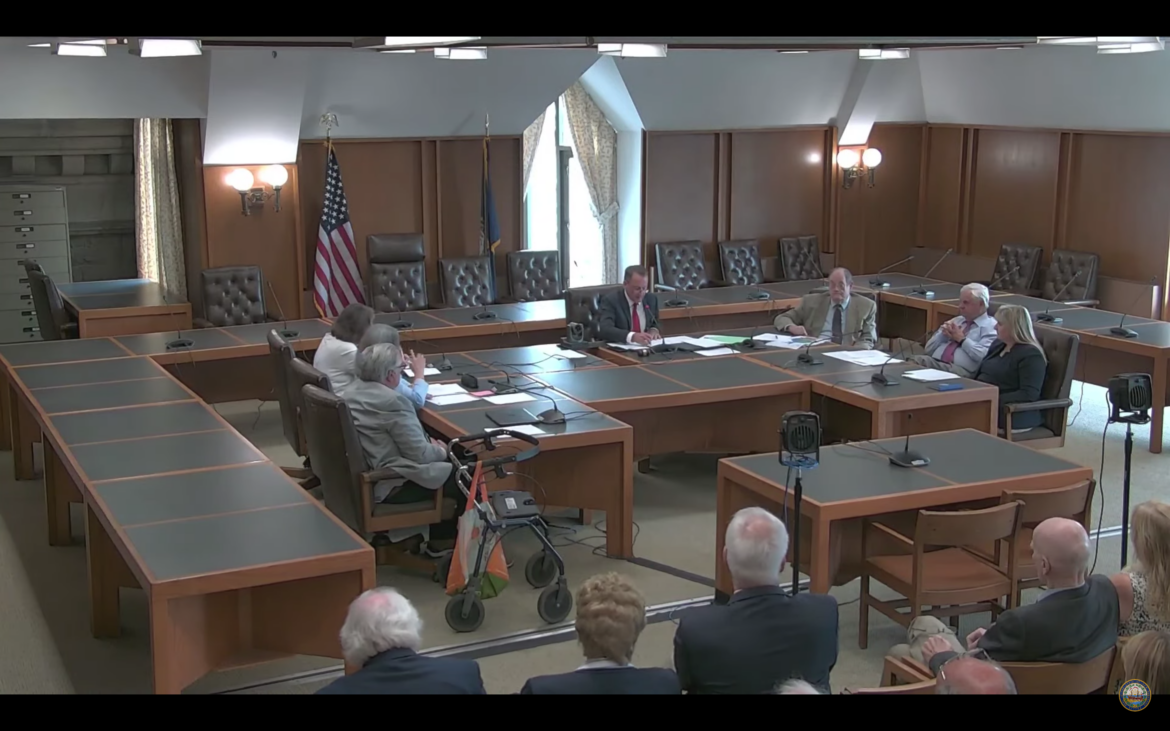By GARRY RAYNO, InDepthNH.org
CONCORD — Conferees initially failed to agree Wednesday on House Bill 75 that would divide Strafford County into three county commissioner districts which left the bill’s fate in the hands of the House Speaker and Senate President.
The two Democrats on the seven-member committee of conference opposed the plan drafted by Sen. James Gray, R-Rochester, and approved by the Senate on a partisan 14-10 vote.
The Democrats, Senate Minority Leader Donna Soucy of Manchester and Rep. Laurel Stavis of West Lebanon, refused to sign off on the conference committee report.
Stavis was replaced with a Republican representative by House Speaker Sherman Packard, and Soucy was expected to be replaced with a Republican by Senate President Jeb Bradley.
The change would divide the county, which currently elects its three commissioners countywide, into three districts that divides the two largest cities Rochester and Dover.
Originally the bill would have increased the bidding threshold for property owned by the county, but the provisions of the bill were added to another bill that has already passed the House and Senate.
The Senate used the bill to divide Strafford County into the three County Commissioner Districts.
The county has long elected its three county commissioners at-large, the only county of the state’s 10 to do so.
The provisions of Gray’s amendment are the same as House Bill 270, which was retained by the House Municipal and County Government Committee, and he said he was asked by a constituent to bring the provisions forward.
He noted the bill with the three districts had a public hearing in the Senate, not in the House although HB 270 did have a public hearing.
Last week, the House at first voted not to agree to the Senate changes by three votes, then voted not to kill the bill by the same three votes, and after several other motions, voted by two votes to send the bill to a committee of conference.
Under Gray’s amendment the division divides both Rochester and Dover into two different districts with surrounding towns leaving only Somersworth wholly in one district, which it shares with three Rochester wards and four northern towns in the county.
Another District has wards from both Dover and Rochester and the towns of Barrington, Madbury and Strafford, while the other district has four Dover wards along with the towns of Durham, Lee and Rollinsford.
The plan creates at least one district that would favor a Republican candidate, while packing District 2 heavily with Democrats, and the last district would lean Democratic.
The plan would force two incumbent commissioners to run against each other if they wanted to run for re-election.
Gray said he was asked by the county administrator to develop a plan that would have the incumbent commissioners in separate districts, which he did, and asked if a Democrat conferee wanted to propose the plan, but neither did.
Soucy said she wonders why the change was done in this way noting the same complaints they heard about redrawing the House boundaries in Strafford County apply to the commission districts, noting some towns are barely contingent and cities are split up.
“Why split up (the county)? Why was this not brought forward (during redistricting).” she asked. “This is in my view a partisan move to change these districts.”
Soucy said she struggles with the process and was not prepared to vote for the change.
Stavis said as a member of the House Municipal and County Government Committee, they vote to change county procedures all the time, “but we don’t do changes like this one.”
Usually there is more than one constituent and usually from both parties, she noted, and the committee hears from all sides of the issue.
With the retained bill, Stavis said they would be able to consult all stakeholders and arrive at a well-informed decision later this year.
Rep. Len Turcotte, R-Barrington, said as a member of the House redistricting committee he brought up the issue of dividing Strafford County into districts, but was told the leadership did not want to muddy the waters and put it into the mix.
He said the redistricting committee held hearings in the 10 counties in the state and never heard one word about county commission districts.
Turcotte said the current arrangement with commissioners elected countywide amounts to default gerrymandering.
He said most people who talk about gerrymandering don’t have a clue what it is.
“I can make a very strong argument,” Turcotte said, “it is as Strafford County has been the last 40 years.”
Turcotte and Gray argued redrawing the political boundaries now would not be unconstitutional, as opponents claim, because this would be districting the county not redistricting it as it was not touched during the process last year.
Rep. Richard Lascelles, R-Litchfield, argued when all the commissioners are elected countywide, the minority is left behind.
“The history of the county is the minority has been left behind time after time after time,” he said. “After a while people in the minority figure out they have been disenfranchised so they lose faith in the political system.”
Changing the county to commissioner districts will give people in rural areas much better representation, he said.
The agreement on House Bill 75 will still need to be approved by the House and Senate when they meet June 29.
Garry Rayno may be reached at garry.rayno@yahoo.com.





